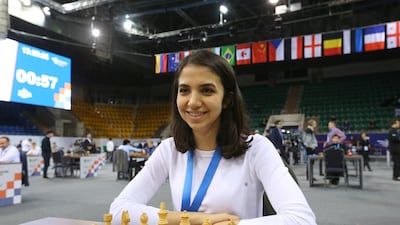Iranian chess player Sara Khadem said she still hopes to represent Iran after competing without a headscarf in an international tournament.
Iran has produced some of the world's best chess players, but some have opted to play for other countries when national decisions began to affect their performance. Alireza Firouzja, 19, now plays for France after her progression was stymied by Iranian authorities not allowing her to play against Israeli rivals.
Now, Sarasadat Khademalsharieh, known as Sara Khadem, has fled to Spain after appearing at the International Chess Federation (FIDE) World Rapid and Blitz Chess Championships in Almaty, Kazakhstan, without a headscarf — mandatory wear for women under Iranian law.
Her action was seen by some as a show of support for the protests that have gripped Iran since the death in custody of Mahsa Amini, 22, on September 16. Ms Amini had been arrested by Tehran's morality police for an alleged breach of the country's strict dress code for women.
The chess player, 25, moved to Europe with her husband, film director Ardeshir Ahmadi, and their 10-month-old son Sam early this month.
In an interview published on Sunday in Spanish newspaper El Pais, Khadem said that before the tournament in Almaty she would only wear the hijab “if there were cameras, because I was representing Iran”.
“But with the veil I am not myself, I don't feel well, and therefore I wanted to put an end to that situation. And I decided not to wear it any more,” she said in her first public comments since moving to Spain.
The newspaper said the interview was carried out at a “secret location for security reasons”.
She still wishes to represent Iran internationally, but whether she will be able to is still in question. Other athletes who have express tacit or outright support for the protest movement or chosen not to wear hijab at competitions have suffered consequences at home.
National karate champion Mohammad Mehdi Karami was executed this month — after a hearing lasting only 15 minutes — over the killing of a member of the Basij paramilitary during a protest near Tehran. Iranian Premier League footballer Amir Nasr-Azadani has been sentenced to 16 years in jail for attending a protest.
Khadem said she hoped her relatives in Iran would not “suffer reprisals because if anyone should give explanations for my actions, it is me, not them, since the decision was mine alone”.

